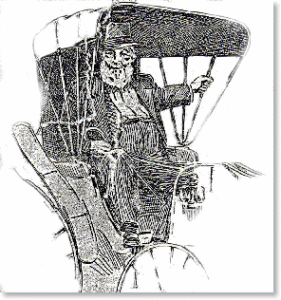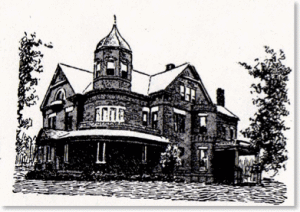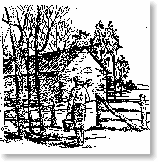Colonel Allen McGee is 85
Seventy-three years ago Allen B.H. McGee came to Kansas City. Yesterday was the eighty-fifth anniversary of his birthday, and last night the event was celebrated by Colonel McGee and his friends at the old McGee homestead, at Thirty-seventh and Broadway. Of course there was a birthday cake with eighty-five candles, and Colonel McGee cut the cake with great ceremony. D. B. Holmes made a short speech as he
 presented a birthday present to Colonel McGee, and the colonel replied that he appreciate the love of his friends. Then everyone drank his health and the colonel whispered under his breath:
presented a birthday present to Colonel McGee, and the colonel replied that he appreciate the love of his friends. Then everyone drank his health and the colonel whispered under his breath:“Wait ’til I’m a hundred and then we’ll have a time sure enough.”
All of Valentine was once a farm
The lots in Valentine where all of our houses stand today can be traced back to a common root – the farm of Allen Burr Harrison McGee.
McGee, the son James H. McGee, of one of the founders of Kansas City, originally owned all of the land from Broadway to State Line, from 31st to 39th Streets. During his 71 years on the “farm,” McGee and his family lived in a cabin, built a more elaborate house and locally-renowned barn on the property, built a grand hotel and finally built the house that current stands at 3758 Washington.
The McGee Family
James McGee came to the Kansas City area from Kentucky in 1827. He took out a patent to own land the next year, making him one of the first white men to own land locally. James McGee was convinced that the land he was clearing would eventually become a great city.
With the help of son Allen, McGee began operating a mill that became “one of the best-known industries of the West,” (according to data pertaining to the McGee family was given to Mrs. Max A. Christopher by Mrs. Nellie McGee Nelson, Miss Eleanor McGee and Mr. Milton McGee Vincent, from web page http://www.yourlaunchpad.com/terry/jackson/mcgee.htm.)
The family then increased the power of the mill, grinding flour and meal for nearby settlers and the Indians living in the territories across the state line. The family also built the first brick kiln in the areas and Allen later helped to run a distillery.
Allen helped his father with the government contracts to supply the tribes and apparently was very good at it.
“He was always a favorite with the Indians and his fairness and kindness won him many friends among the red race. He became familiar with their habits and modes of living and knew how best to deal with them, ” acording to A Memorial and Biographical Record of Kansas City and Jackson County, Mo., written in 1896.
According to one source, A Memorial and Biographical Record of Kansas City and Jackson County, Mo.) James McGee went back to Kentucky and brought back the first slaves to western Missouri.
James developed the land around 16th and Grand and built a cabin near 20th and Central. Allen’s brother Milton McGee was a prominent real estate developer and the second mayor of Kansas City.
Allen B.H. McGee starts a farm
Allen McGee, who had come to Missouri with his family when he was 12, learned many useful skills working for his father. Just before he turned 21, he left the family home and cleared his own tract of land. Allen then went back to Kentucky and got a bride, bringing back his first wife, Melinda Frey McGee. (After Melinda died, McGee married who sister, who also died. His third wife was Susan Gill, daughter of one of the founders of Kansas City).
When Allen and his first wife settled into the “old homestead,” the future Valentine was still part of the wilderness.
There was a jockey named Isaac Murphy who used to come to that fairground racing session, and everybody said he was one of the greatest jockeys in the world and what a thrill a boy got out of seeing Isaac Murphy up close and maybe hearing him say something.
“The town of Westport had then no existence. The little cabin was supplied with furniture made by the Indians and purchased of Rev. Thomas Johnson. The beds were grass, and it can easily be imagined that the materials in the home were crude and primitive but nonetheless many happy days were passed there, for there was something about the freedom and genuineness of the pioneer life. Mr. McGee cleared the place and transformed it into a richly cultivated tract. He also took contracts to build the church and school-house in his neighborhood, and in various ways was connected with the up-building and development of this locality. As time passed he made additions to his hewn-log cabin, afterward weatherboard and plastered it, and made a comfortable home.”
As Westport developed and began a jumping-off point for exploration of the west, McGee went into the outfitting business and helped prepare pioneers for their explorations. His outfitting business brought him into contact with many of the famous pioneers, from English lords who came for buffalo hunts to the many prospectors who went to California in search of gold. In fact, the famous explorer John C. Freemont prepared for his trips in Westport, and sometimes stayed at the McGee home while he was here.
McGee pursued many different endeavors in his lifetime, which was typical of the city founders. He was a farmer, an Indian trader, a surveyor, and an outfitter; he built a store in Westport; he established the second tavern in Westport (which was later operated as the Harris House); and he bought and sold mules.
McGee took three wives, marrying his first wife’s sister after she died. His third wife, Susan Gill, was the daughter of Judge Gill, once of the founders of Westport. Mc Gee lived to be 88, and when he died in 1903, hee was the oldest living settler of Westport.
Buildings on the McGee Property

When McGee bought the 160-acre farm in 1838, it was on the northern edge of Westport, which was as much as an hour away from Kansas City by mule line.
The first building on the property was a log house. The McGees later replaced that with a white frame home, and in 1888, built a large brick home (at left) that was one of the most famous in the city.
Equally famous was the McGee barn. When McGee died in 1903, the Kansas City Star included a description of the barn in his obituary article.
“ The stone barn, which formerly stood on the McGee homestead at Thirty seventh and Washington Streets, was known to every person who lived in Kansas City for any length of time. It stood as a landmark until it was torn down sis years ago (in 1897) to make way for the house now occupied by A.B.H. McGee Jr. The stones in the old barn were  used in the construction of the house. It was a wide barn, eighty feet long by forty feet wide, and with walls two feet thick. It had loopholes for windows and a long wooden door studded with spikes,” the Kansas City Star wrote in 1903.
used in the construction of the house. It was a wide barn, eighty feet long by forty feet wide, and with walls two feet thick. It had loopholes for windows and a long wooden door studded with spikes,” the Kansas City Star wrote in 1903.
McGee told folks he wanted to barn to hold up because someone had set fire to his previous barn. Some thought it looked like a fort, although McGee claimed it was never used as one. He did say, however, that it was useful at times to “keep out the Jawhawkers. ” (Jayhawkers were guerilla fighters from Kansas who often conducted raids into the proslavery settlements in Missouri).
“Silverware and other valuables were buried in the ground during rough times. Some of the marauding bands did get into it (the barn) and they tried to dig up the valuables. But Colonel McGee had anticipated them. When the barn was torn down a few years ago, the scrapers which graded down the site uncovered dozens of bayonet points, which had been broken off in an attempt to get at the silverware. ”
The barn was torn down in 1897 and the site was used for the home of Allen B. H. McGee Junior’s home, which still stands at 3758 Washington.
The old McGee mansion at 3736 Broadway was razed in 1917, except that the brick walls were left for the Rochambeau Hotel that was built in its place. That hotel, with 80 rooms and suites, had 170 feet of frontage on both Broadway and Washington Streets.
